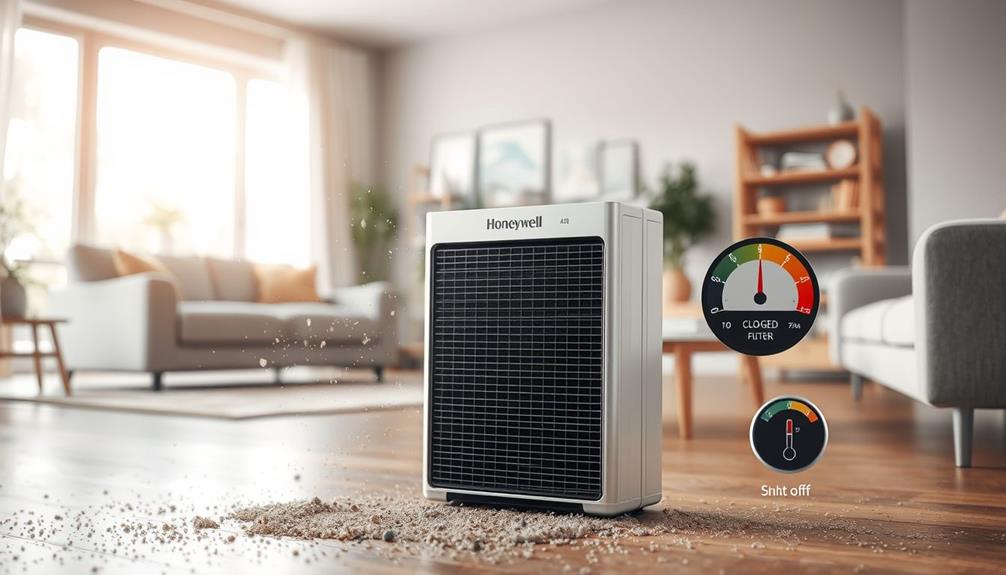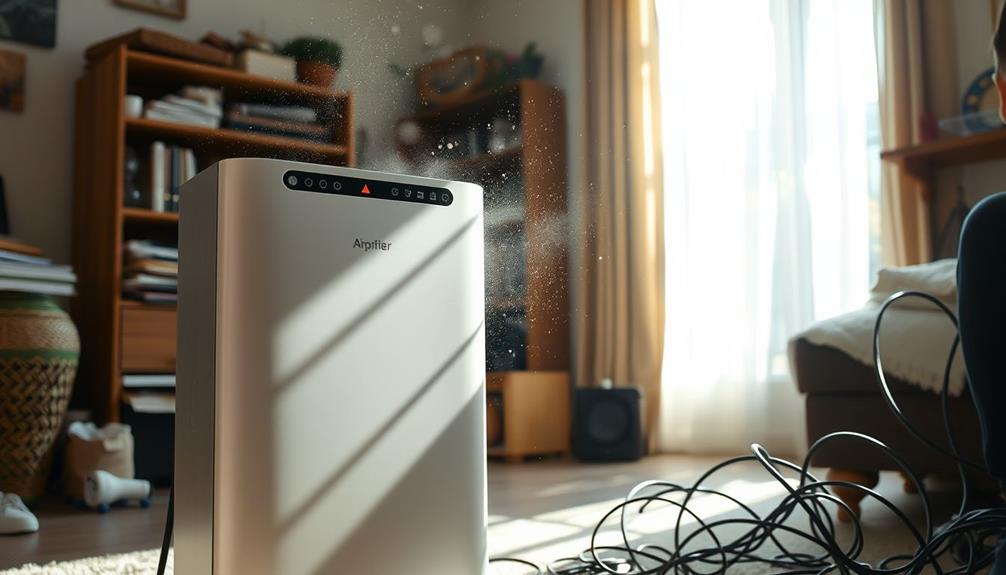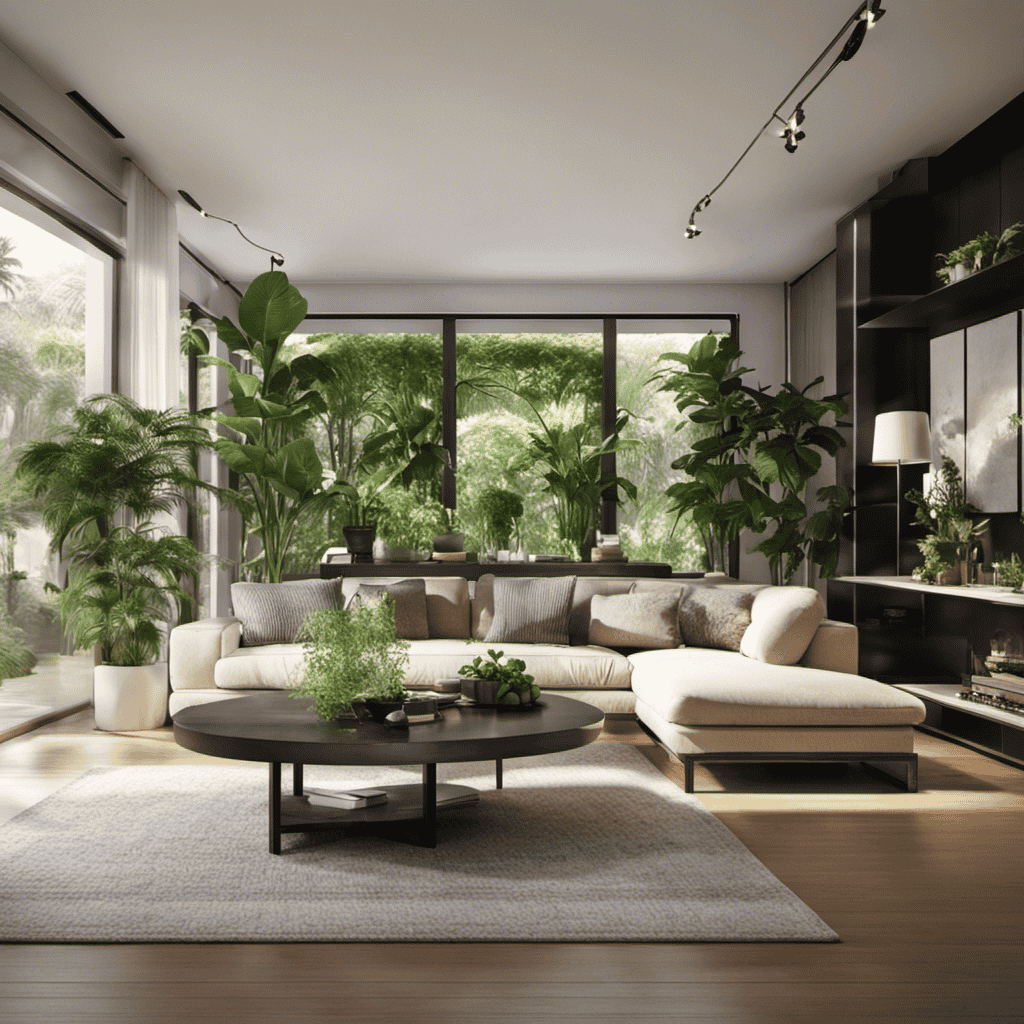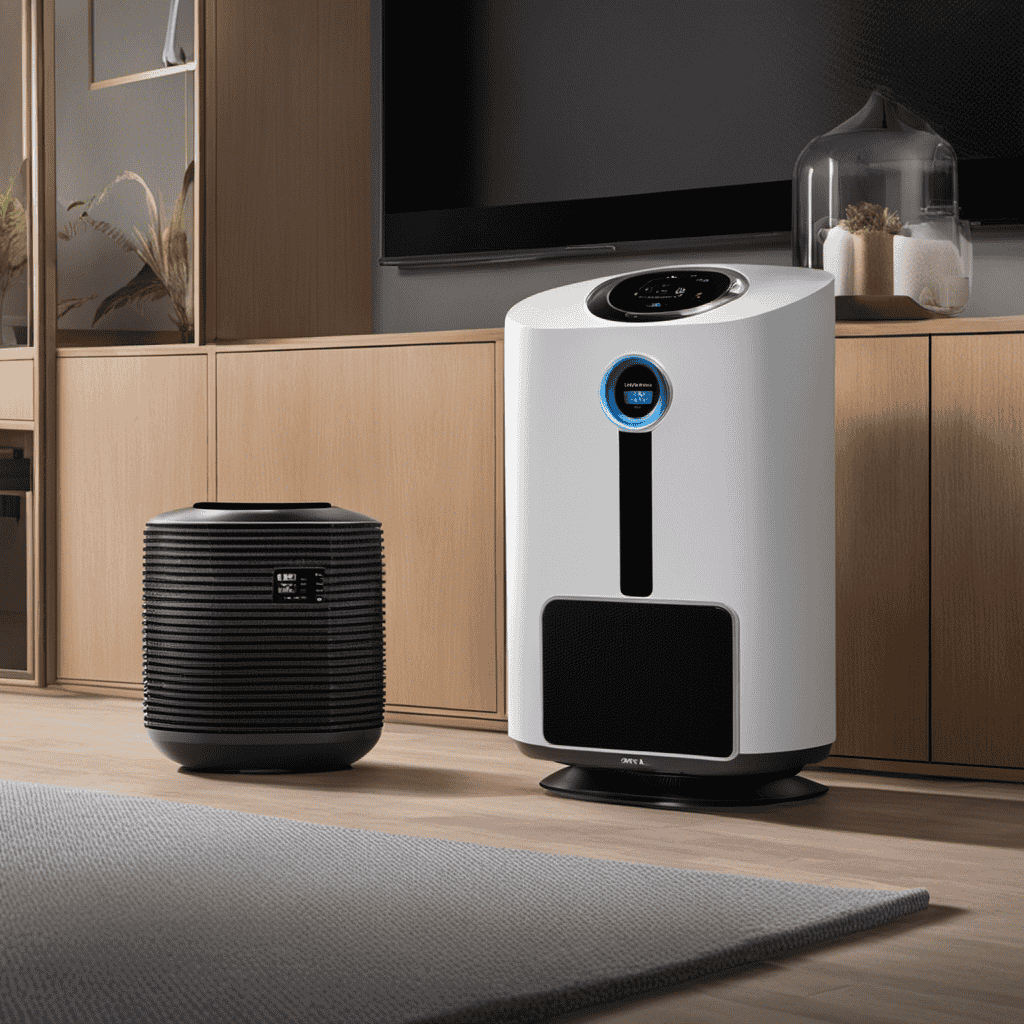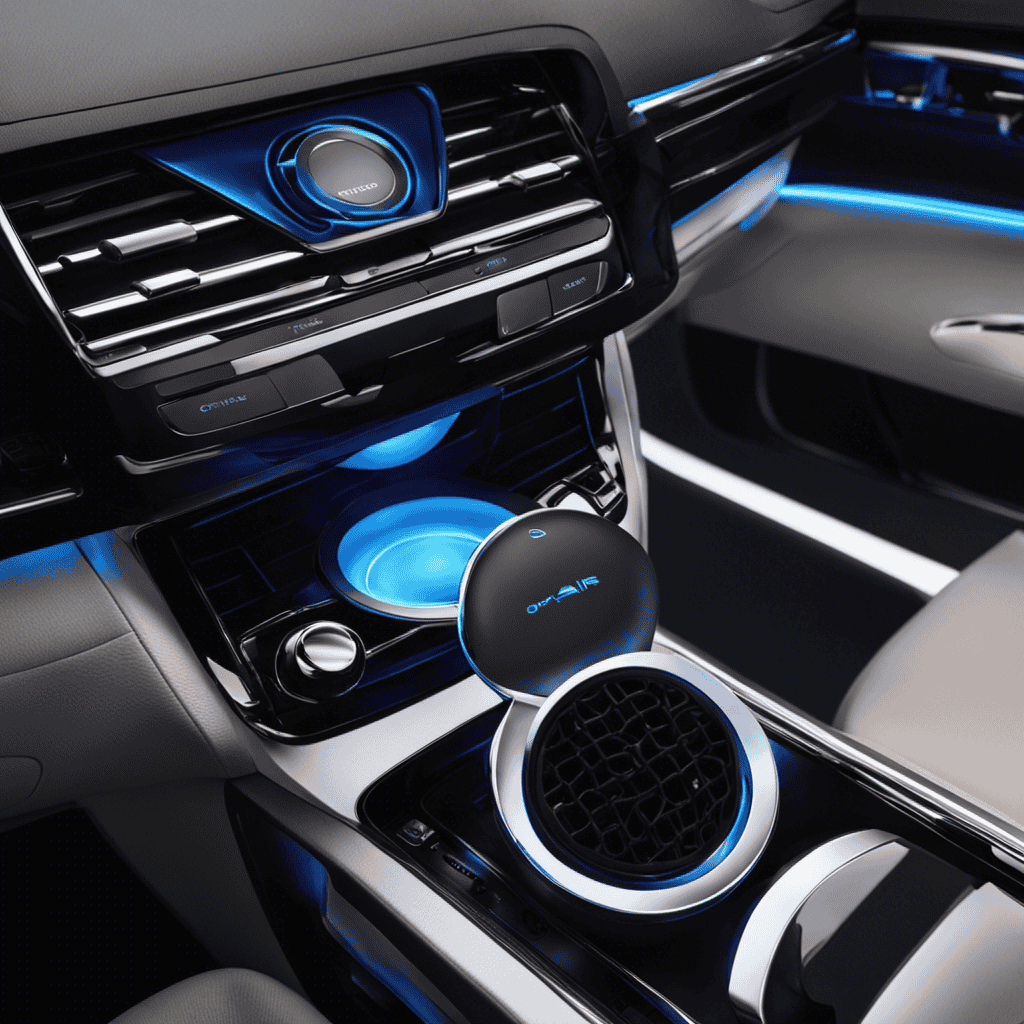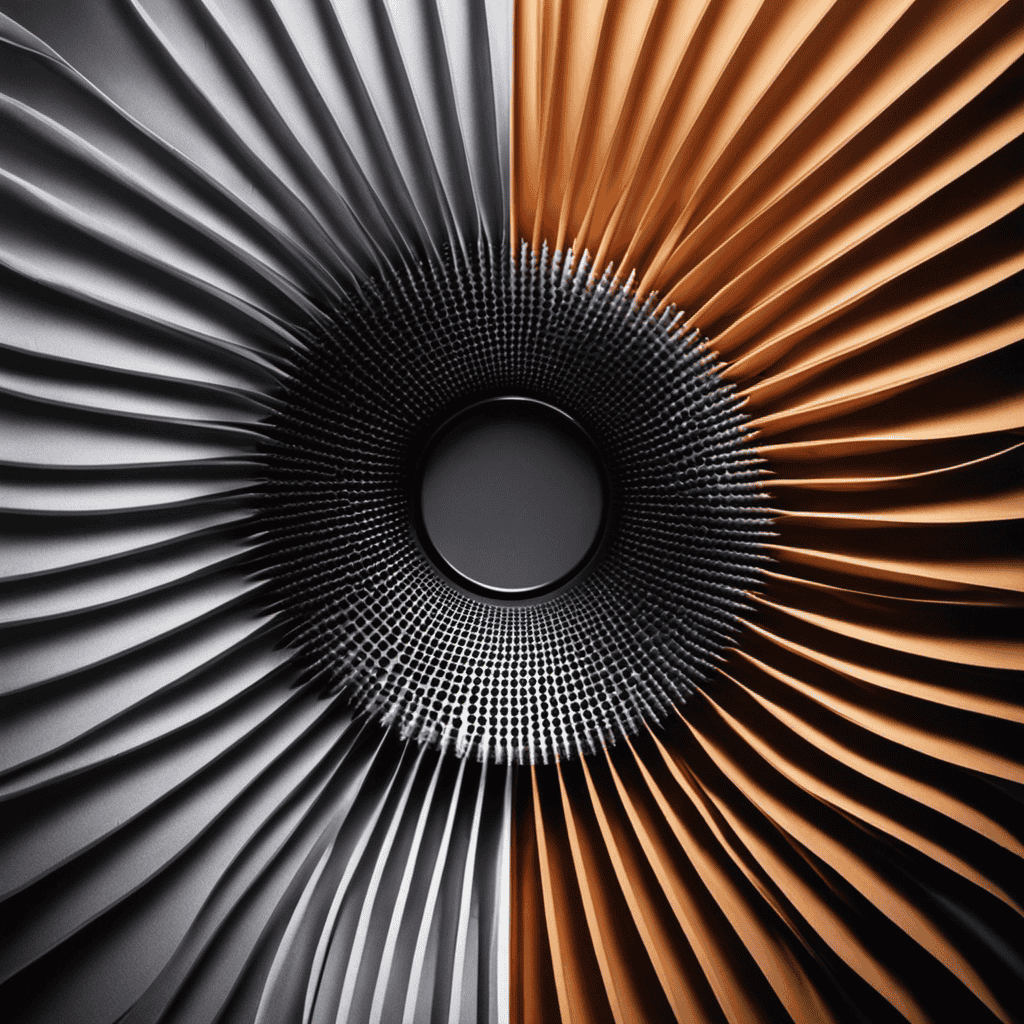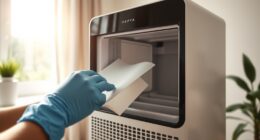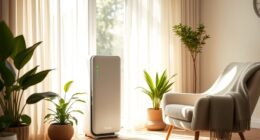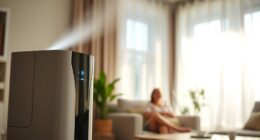If your Honeywell air purifier keeps shutting off, it might be due to clogged filters, overheating, power supply issues, or sensor errors. Clogged filters reduce airflow and can trigger automatic shutdowns. Overheating often causes safety shutdowns, especially if you notice unusual noises or smells. Checking your power supply for damaged cords or blown fuses is essential, as is ensuring sensors are clean and well-calibrated. Regular maintenance, including filter cleaning and replacements, can prevent these issues. Stick around, and you'll discover more tips to keep your air purifier running efficiently.
Key Takeaways
- Clogged filters reduce airflow, leading to shutdowns; clean pre-filters every three months and replace HEPA filters annually.
- Overheating can trigger safety shutdowns; ensure proper ventilation and regular maintenance to prevent this issue.
- Excessive contamination from dust may disrupt airflow and damage the unit; regular cleaning is essential for optimal performance.
- Power supply issues, such as frayed cords or blown fuses, can cause unexpected shutdowns; inspect plugs and outlets for any faults.
- Sensor errors can disrupt performance; regularly clean sensors and contact customer support for calibration assistance if necessary.
Common Reasons for Shutdowns
When your Honeywell air purifier shuts off unexpectedly, it can be frustrating, especially if you don't know why it's happening. One common reason your air purifier keeps shutting off is clogged filters. When dirt and debris build up, airflow gets restricted, which can lead to overheating and force the unit to shut down for safety reasons.
Regularly cleaning or replacing filters is essential to maintain peak performance, as proper maintenance extends the lifespan of the unit.
If you notice frequent shutdowns, it might indicate excessive contamination within the unit. Neglecting regular cleaning beyond just filter changes can disrupt its efficiency.
Additionally, manufacturing defects can cause unexpected shutdowns in newer models, so don't hesitate to seek professional help if you suspect this issue.
Lastly, consider the age of your air purifier. An aging unit naturally loses efficiency and may shut off more often.
If your purifier has been around for several years, it might be time to look into replacement filters or even a new unit altogether. Keeping an eye on these factors can help you enjoy cleaner air without interruptions.
Overheating Issues
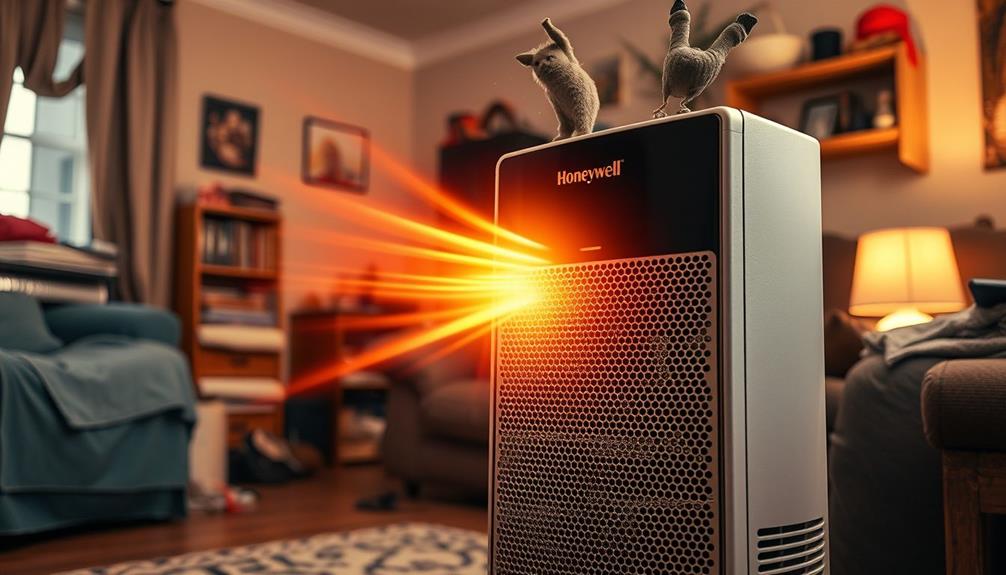
Unexpected shutdowns often signal underlying issues, and overheating is a significant concern for Honeywell air purifiers. When your unit overheats, it can lead to automatic shutdowns as a safety precaution. You might notice signs like unusual noises or even a burning smell, which require immediate attention.
To enhance the longevity of your air purifier, consider incorporating hydration strategies to optimize metabolism during the climb into your routine by maintaining a comfortable humidity level in your home.
To prevent overheating, regular maintenance is essential. Make sure to clean or replace the filters every 3 to 12 months. Clogged filters restrict airflow, which can cause the unit to overheat.
Additionally, make certain your air purifier is placed in a well-ventilated area. This promotes better airflow around the unit, helping to dissipate heat effectively.
If you've followed these steps and your Honeywell air purifier continues to overheat, it's time to seek help. Contact Honeywell customer service for assistance and potential repairs.
They can provide solutions tailored to your specific model and situation, making sure your air purifier operates safely and efficiently. Taking these precautions won't only help prevent overheating but also prolong the lifespan of your unit, keeping your indoor air clean and comfortable.
Filter Clogging
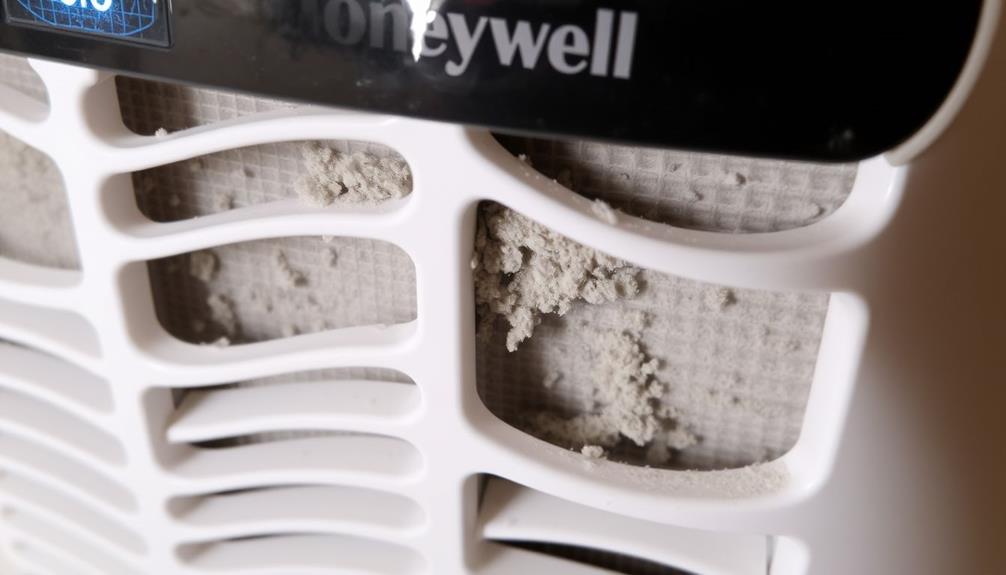
If you notice your Honeywell air purifier shutting off frequently, it might be a sign of clogged filters.
Regular maintenance is essential, so check and clean your pre-filters every three months and replace HEPA filters annually.
Keeping your air clean is just as important as ensuring your pets' health, especially since dog health and nutrition can be impacted by poor air quality.
Staying on top of these tasks will help maintain airflow and keep your purifier running efficiently.
Symptoms of Clogged Filters
A clogged filter can be a silent disruptor in your air purifier's performance. When your filters become clogged, you might notice that the airflow is considerably reduced, leading to insufficient air circulation and decreased purification efficiency.
One clear symptom is the illumination of the red filter change indicator light, which signals that your filters need immediate attention. If you've been ignoring this warning, your air purifier keeps turning off to prevent overheating, a protective measure against potential damage.
Regular maintenance is vital, as neglected filters can't only compromise air quality but also contribute to increased stress levels in your environment, similar to how essential oils for relaxation can enhance your well-being.
Another sign of clogged filters is a decline in air quality. You may experience increased dust, allergens, or odors in your space, as dirty filters can trap pollutants instead of removing them effectively.
If you've recently changed the HEPA filter and still notice these issues, you might want to check the pre-filters, which should be inspected every three months.
Regular maintenance and timely filter replacements are fundamental for keeping your air purifier running smoothly and efficiently. By staying vigilant and addressing clogged filters promptly, you guarantee ideal performance and cleaner air in your home.
Maintenance and Cleaning Tips
Regular maintenance is key to keeping your Honeywell air purifier running efficiently and preventing filter clogging. Start by inspecting and cleaning the pre-filter every three months. This simple step guarantees ideal airflow and prevents dust buildup. Don't forget about your HEPA filters; replace them annually to avoid performance issues and automatic shutdowns.
Here's a quick reference for your maintenance routine:
| Task | Frequency | Notes |
|---|---|---|
| Clean pre-filter | Every 3 months | Rinse under water as per guidelines. |
| Replace HEPA filter | Every 12 months | Check indicator light for alerts. |
| Rinse washable filters | As needed | Follow manufacturer's instructions. |
| Monitor air quality | Monthly | Maintain a clean environment around unit. |
Keeping an eye on the filter replacement indicator light on your air purifier's control panel can help remind you when it's time for a change. Finally, placing your air purifier in a clean environment minimizes surrounding dust and debris, contributing to better air quality and overall efficiency. Regular maintenance leads to cleaner air and a longer-lasting unit.
Proper Filter Replacement Schedule
Keeping your Honeywell air purifier in prime condition means sticking to a proper filter replacement schedule. Regularly check and replace the pre-filters every three months to prevent clogged filters, which can hinder airflow and lead to overheating.
Implementing a routine maintenance check for your air purifier can enhance its reliability and efficiency, similar to how home security systems require regular updates and evaluations. If you're using HEPA filters, aim to replace them approximately every 12 months. They lose their effectiveness as they fill with trapped particles.
For those using HEPA Clean filters, make sure to replace them every four to six months to maintain peak air quality.
Always consult the manufacturer's guidelines for specific filter replacement intervals tailored to your air quality conditions and usage frequency. Neglecting to replace the filters on time can cause serious issues, including automatic shutdowns of your air purifier due to reduced airflow.
Clogged filters not only compromise air purification but can also damage your unit, leading to costly repairs. By staying on top of your filter maintenance, you'll help guarantee your Honeywell air purifier runs efficiently, keeping your indoor air fresh and clean.
Excessive Contamination
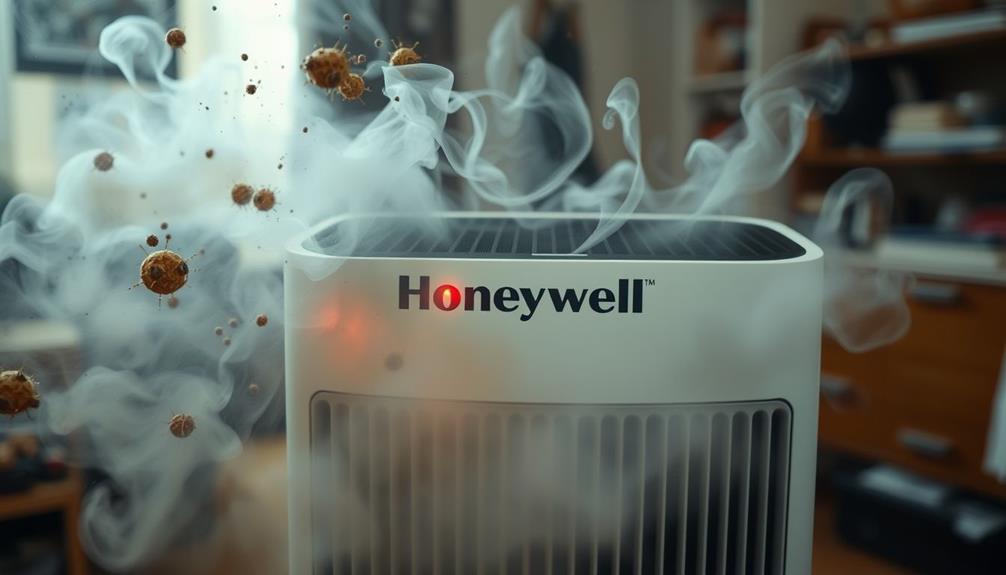
Excessive contamination in your Honeywell air purifier can lead to serious performance issues, including unexpected shutdowns to prevent overheating.
When dust and debris accumulate, they disrupt airflow, forcing your unit to work harder and increasing the risk of failure. Clogged filters are a major culprit; when they're not replaced according to manufacturer guidelines, they reduce efficiency and heighten the chances of your purifier shutting off automatically.
Regular maintenance is essential, similar to how you'd choose a home cleaning service to guarantee a clean environment.
To avoid these problems, make it a habit to regularly clean your air purifier and check the air filter. Inspect for any foreign objects inside the unit that could exacerbate contamination levels.
A clean environment can greatly help in maintaining low contamination levels, allowing your air purifier to function effectively without interruptions.
Power Supply Malfunctions
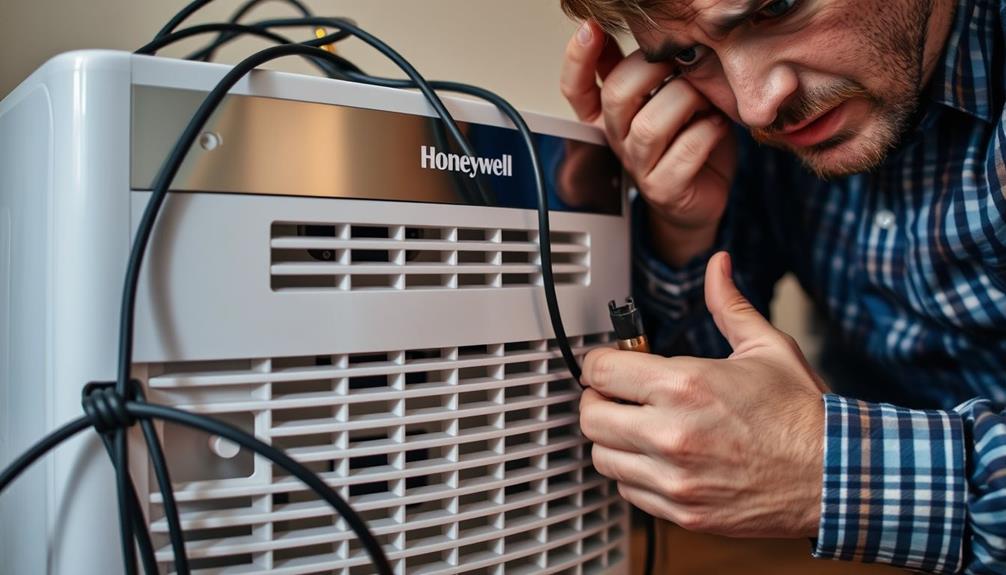
When your Honeywell air purifier suddenly shuts off, it's essential to check the plug and outlet first.
Cats may show signs of stress in environments with power supply issues, much like how they react to changes in their surroundings.
Verify the outlet is functional and the plug fits snugly, as loose connections can cause power issues.
You might also need to inspect the fuse and ascertain the power rating of your unit matches your home's electrical supply.
Plug and Outlet Check
Start by confirming your Honeywell air purifier is plugged into a functioning outlet, as loose connections can spark power supply issues. Gas appliances typically function without electricity, relying on gas supply, so it's important to verify your electrical appliances are stable.
Check the outlet by plugging in another device; if that doesn't work, the outlet might need repair or a reset. A faulty outlet can lead to your air purifier shutting off unexpectedly.
Next, inspect the power cord for any visible damage, like frayed wires. Damaged cords can cause electrical malfunctions, affecting the performance of your device. If you spot any issues, it's best to replace the cord to avoid any safety hazards.
To further protect your air purifier, consider using a surge protector, as power surges can damage appliances considerably and lead to sudden shutdowns. Appliance surge protection can help safeguard your devices from these interruptions.
If you've checked the plug and outlet but your air purifier still won't stay on, it might be time to consult a professional technician. They can assess and resolve any underlying electrical problems that could be causing your issues.
Taking these steps can help confirm your Honeywell air purifier runs smoothly and effectively.
Fuse Inspection Needed
Power supply stability is vital for the best performance of your Honeywell air purifier. If your unit keeps shutting off, it's important to inspect the fuse and other components of the power supply. A blown fuse can prevent your purifier from receiving power, so check your electrical system and replace any blown fuses.
Here's a quick checklist to guide you through the inspection process:
| Inspection Step | Action Required |
|---|---|
| Check power cord | Look for frays or visible damage |
| Inspect the fuse | Replace any blown fuses |
| Test different outlets | Rule out outlet issues |
| Use surge protectors | Protect against electrical surges |
| Conduct regular maintenance | confirm secure power connections |
Additionally, electrical surges can cause unexpected shutdowns, so using surge protectors is a smart move. Regular maintenance, like checking connections, can help avoid these power supply malfunctions. By being proactive, you can keep your air purifier running smoothly and efficiently.
Power Rating Compatibility
Verifying the power rating of your Honeywell air purifier aligns with the specifications of your wall socket is essential to prevent electrical malfunctions. If you're using a power outlet that doesn't supply adequate voltage, your unit may shut down unexpectedly due to insufficient power. This can be frustrating, especially when you rely on your air purifier for clean air.
Regular maintenance and effective content strategies can also help you identify any underlying issues that might affect performance.
Inspect the power cord for frayed wires or loose connections. These issues can lead to an intermittent power supply, which may cause your purifier to shut off at inconvenient times. Additionally, electrical surges or fluctuations in the power supply can trigger automatic shutdowns.
To help mitigate this risk, consider using a surge protector to safeguard your device.
It's also important to regularly check and reset circuit breakers to verify your air purifier receives a consistent power supply. A faulty circuit board can further complicate matters, leading to performance issues.
Sensor Errors
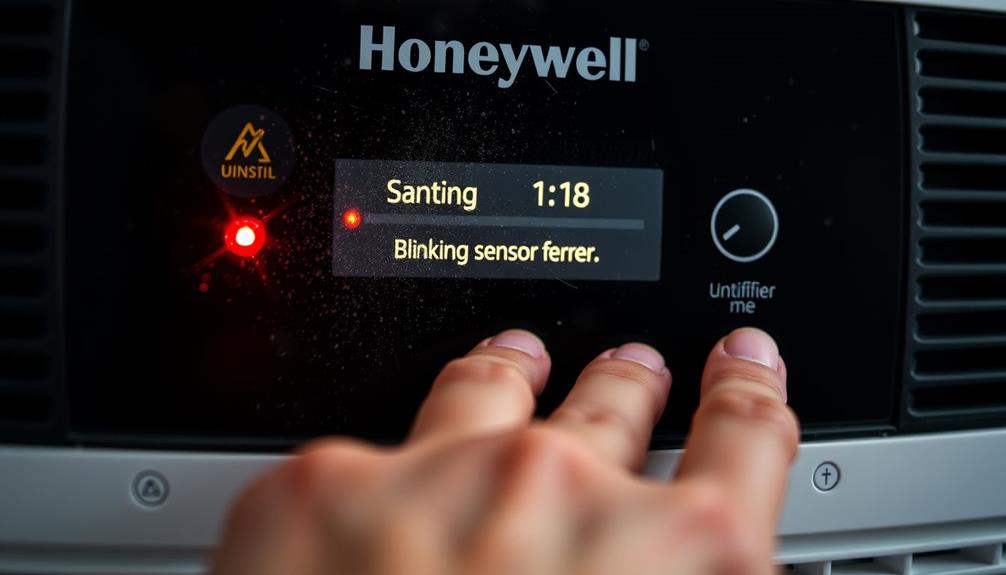
Over time, you may encounter sensor errors with your Honeywell air purifier that can disrupt its performance. These sensor errors can lead to unexpected shutdowns if the unit detects incorrect air quality readings or if the sensors become clogged with dust and debris.
To prevent this, it's essential to regularly clean sensors using a soft, lint-free cloth. This simple step helps guarantee accurate air quality monitoring and can keep your Honeywell air purifier running smoothly. Additionally, adopting a holistic lifestyle approach can enhance your overall well-being, which may include maintaining clean air quality at home.
Some models include a calibration option that may need periodic adjustments to maintain sensor accuracy. If your air purifier continues to shut off due to sensor errors after you've cleaned the sensors, it might be time to reach out for help.
Don't hesitate to contact Honeywell customer service for further assistance or potential repairs. Remember, understanding that sensor malfunctions might be linked to excessive contamination within the unit highlights the need for routine maintenance and filter changes.
Keeping your air purifier in top shape guarantees you enjoy clean air without interruptions.
Maintenance Tips
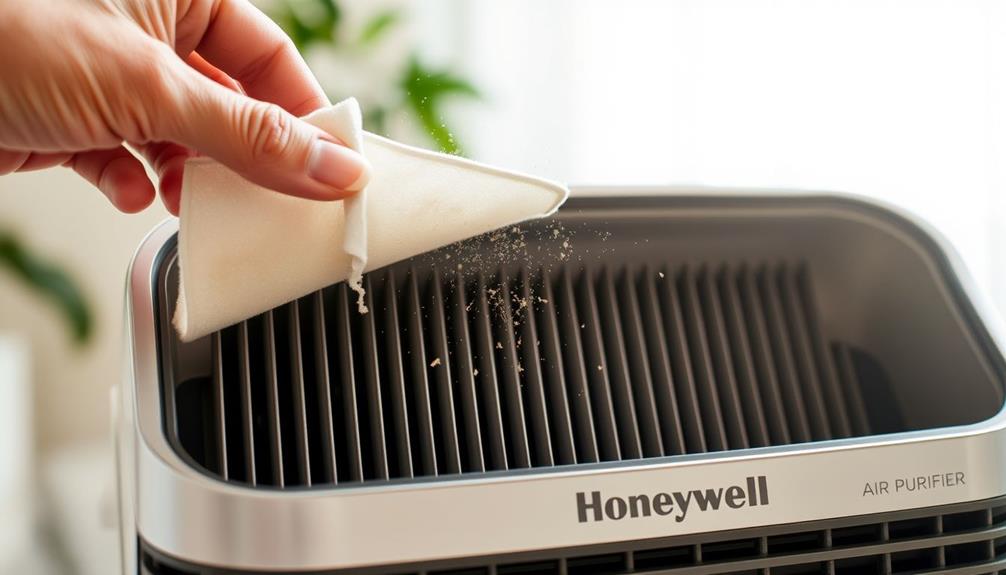
Regular maintenance of your Honeywell air purifier is vital for its performance and longevity. Start by regularly cleaning or replacing the filters in your Honeywell according to the manufacturer's guidelines. Pre-filters should be replaced every three months, while HEPA filters need changing every twelve months. This helps guarantee ideal airflow and prevents shutdowns caused by clogged filters.
Make sure you place your air purifier in an ideal location, free from obstructions. Proper air intake and exhaust are essential for effective operation. You should also periodically inspect and clean the fan and air intake areas to remove dust and debris, which can hinder airflow and lead to overheating.
Don't forget to monitor the filter replacement indicator light on the control panel. After changing the filters, hold the reset button for five seconds to keep track of your maintenance needs accurately.
Conclusion
To sum up, if your Honeywell air purifier keeps shutting off, don't let frustration cloud your air quality. By addressing overheating, filter clogging, and power supply issues, you can breathe easier and keep your purifier running smoothly. Think of it as giving your device a little TLC—it'll reward you with cleaner air and a happier home. So, roll up your sleeves, tackle those maintenance tips, and let your purifier work its magic without interruption!
